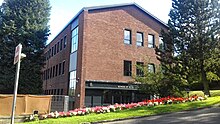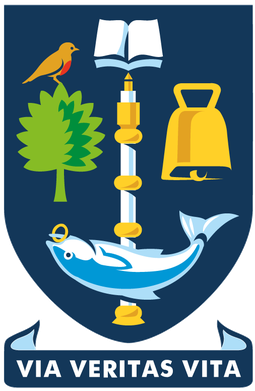
The University of Glasgow is a public research university in Glasgow, Scotland. Founded by papal bull in 1451 [O.S. 1450], it is the fourth-oldest university in the English-speaking world and one of Scotland's four ancient universities. Along with the universities of St Andrews, Aberdeen, and Edinburgh, the university was part of the Scottish Enlightenment during the 18th century. Glasgow is the largest university in Scotland by total enrolment and with over 19,500 postgraduates the second-largest in the United Kingdom by postgraduate enrolment.

James Alfred Wight, better known by his pen name James Herriot, was a British veterinary surgeon and author.

A veterinarian (vet) is a medical professional who practices veterinary medicine. They manage a wide range of health conditions and injuries in non-human animals. Along with this, veterinarians also play a role in animal reproduction, health management, conservation, husbandry and breeding and preventive medicine like nutrition, vaccination and parasitic control as well as biosecurity and zoonotic disease surveillance and prevention.

The Royal Veterinary College is a veterinary school located in London and a member institution of the federal University of London. The RVC was founded in 1791 and joined the University of London in 1949. It is the oldest and largest Veterinary school in the United Kingdom, and one of only 11 in the country where students can study to become a vet.

Sir Ilay Campbell, 1st Baronet, Lord Succoth, (1734–1823) was a Scottish advocate, judge and politician. He rose to be Lord President of the Court of Session.
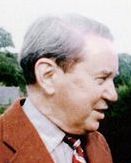
Wallace Brian Vaughan Sinclair was a British veterinary surgeon who worked for a time with his older brother Donald, and Donald's business partner, Alf Wight. Wight wrote a series of semi-autobiographical novels under the pen name James Herriot, with Sinclair and Donald appearing in fictional form as brothers Tristan and Siegfried Farnon. The novels were adapted in two films and television series under the name All Creatures Great and Small. Tristan was portrayed as a charming rogue who was still studying veterinary medicine in the early books, constantly having to re-take examinations because of his lack of application, often found in the pub, and provoking tirades from his bombastic elder brother Siegfried.
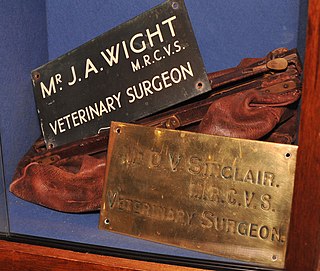
Donald Vaughan Sinclair was a British veterinary surgeon who graduated from the Royal (Dick) School of Veterinary Studies in 1933. He was made famous as the inspiration for the eccentric character Siegfried Farnon in the semi-autobiographical books of James Herriot, adapted for film and television as All Creatures Great and Small.
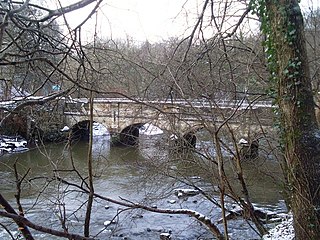
Dawsholm Park is a public park in Glasgow, Scotland, adjoining the Kelvindale, Maryhill and Temple areas of the city, and southern parts of the town of Bearsden. It is situated on the River Kelvin, north of the River Clyde. The park covers an area of 33 hectares, and consists mostly of woodland, with some grass and wildflower meadows in the southeast area of the park.
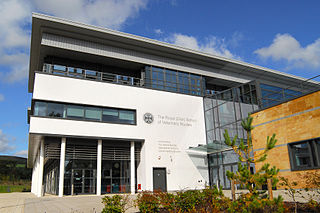
The Royal (Dick) School of Veterinary Studies, commonly referred to as the Dick Vet, is the University of Edinburgh's vet school. It is part of the College of Medicine and Veterinary Medicine.
The Bachelor of Veterinary Science, "Bachelor of Veterinary Medicine" (BVetMed), or "Bachelor of Veterinary Medicine and Surgery" is a degree for studies in veterinary medicine in the United Kingdom, Australia, and several other countries outside the United States and Canada. These degrees qualify one to practice as a veterinarian in the US if the degree is conferred from an American Veterinary Medical Association (AVMA) accredited school and the candidate passes the North American Veterinary Licensing Examination (NAVLE), just as any other US and Canada graduate. They are equivalent to DVM/VMD degrees; the main equalizer being licensure in the US. On 5 March 2015, the Royal College of Veterinary Surgeons (RCVS) Council made the decision to allow UK veterinarians to use the courtesy title "doctor", to align with international practices. The RCVS president said of the change: “Whether one regards the decision as correcting a historical anomaly or simply providing greater clarity at home and abroad, there is no doubt that the issue has generated huge interest".
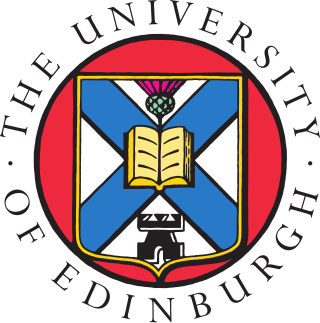
The University of Edinburgh is a public research university based in Edinburgh, Scotland. Founded by the town council under the authority of a royal charter of King James VI in 1582 and officially opened in 1583, it is one of Scotland's four ancient universities and the sixth-oldest university in continuous operation in the English-speaking world. The university played an important role in Edinburgh becoming a chief intellectual centre during the Scottish Enlightenment and contributed to the city being nicknamed the "Athens of the North."
Thomas Jarvie was a Scottish professional footballer, veterinary surgeon and television personality.
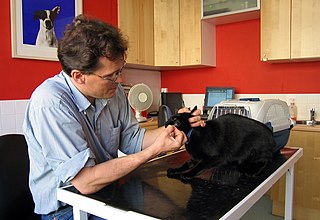
Veterinary medicine in the United Kingdom is the performance of veterinary medicine by licensed professionals. It is strictly regulated by the statute law, notably the Veterinary Surgeons Act 1966. Veterinary medicine is led by veterinary physicians, termed "veterinary surgeons", normally referred to as "vets".

Young James Herriot is a three-part British television drama based on the early life of veterinary surgeon James Herriot. It is part of a series of movies and television series based on Herriot's novels. It features Iain De Caestecker as the title character following his arrival at veterinary college, alongside Amy Manson and Ben Lloyd-Hughes as fellow students Whirly Tyson and Rob McAloon. Directed by Michael Keillor and written by Ann McManus and Eileen Gallagher, it was a Koco Drama production for the BBC which first aired on BBC One in December 2011.
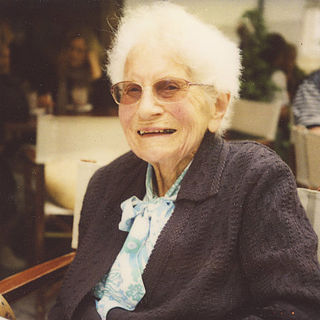
Winifred Mary Brancker (1914–2010) was an English veterinary surgeon, best known as the first woman to become president of the British Veterinary Association since its foundation in 1881.
The All Creatures Great and Small franchise consists of a series of books, movies, and TV series based on books written by James Alfred Wight under the pen name James Herriot based on his experiences as a veterinary surgeon. The books have been adapted for film and television, including a 1975 film All Creatures Great and Small, followed by the 1976 It Shouldn't Happen to a Vet sequel, as well as a long-running BBC television programme of the same title, and a prequel series in 2011, Young James Herriot.
Julian Norton is a British veterinary surgeon, author and TV personality, best known for his appearances on thirteen series of The Yorkshire Vet, which has been broadcast on Channel 5 since 2015.

All Creatures Great and Small is a television series, set in Northern England starting in 1937, based upon a series of books about a Yorkshire veterinary surgeon written by Alf Wight under the pen name of James Herriot. The series was produced by Playground Entertainment for Channel 5 in the United Kingdom and PBS in the United States.
